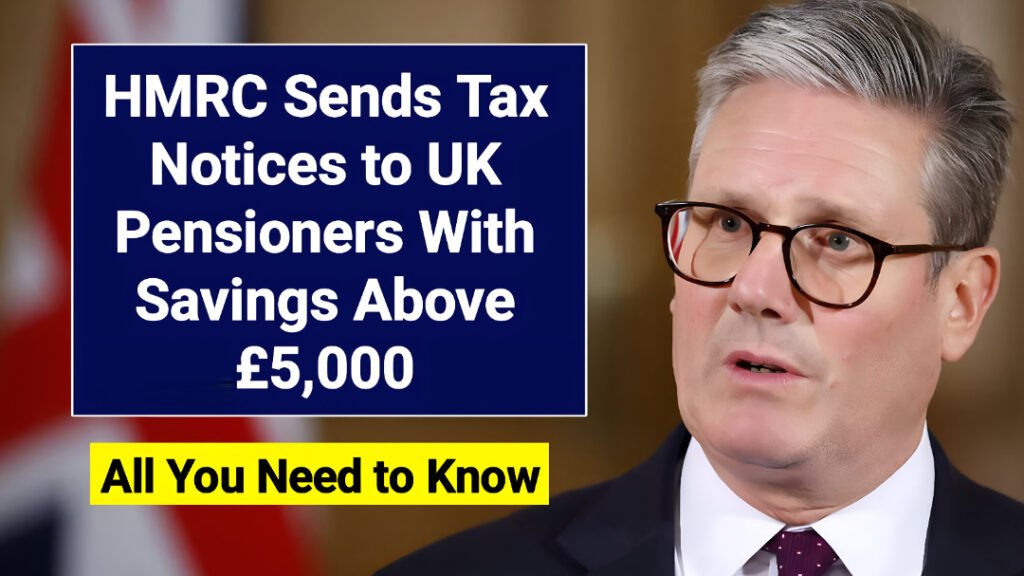The UK government, through HM Revenue and Customs (HMRC), has recently introduced a significant update that affects thousands of pensioners across the country. Pensioners with savings above £5,000 are now being sent tax notices, marking a crucial change in tax reporting and compliance. This update is not just a simple notification — it’s a clear indication that HMRC is intensifying its efforts to ensure all taxpayers meet their obligations. This article will guide you through everything you need to know about these tax notices, including why they’re being issued, how they may affect UK pensioners, and what actions should be taken.
Why HMRC Is Sending Tax Notices to Pensioners
HMRC’s new initiative to send tax notices to pensioners with savings above £5,000 stems from the need to improve transparency and compliance in the tax system. This step aligns with broader reforms in UK taxation aimed at reducing tax avoidance and ensuring fair contributions from all citizens. Pensioners, who may previously have assumed they were exempt from certain tax obligations, now need to be aware that savings above the threshold could trigger new reporting requirements.
Understanding the £5,000 Savings Threshold
The £5,000 savings threshold is a benchmark set by HMRC to identify pensioners who may need to pay additional taxes. If your savings, including bank accounts, ISAs, and investments, exceed this amount, HMRC considers this in calculating taxable income. This is particularly important for pensioners relying on interest income from their savings, as even a small amount above the threshold could result in a tax notice.
How HMRC Calculates Tax for Pensioners
HMRC calculates pensioners’ tax based on total income, which now explicitly includes interest earned from savings above £5,000. This calculation can be influenced by various factors such as personal allowance, other sources of income, and existing deductions. For pensioners, the interest income from savings can be enough to move them into a higher tax bracket or trigger additional liabilities, making it crucial to understand how HMRC performs these calculations.
Impact of Tax Notices on UK Pensioners
Receiving a tax notice can be stressful, particularly for pensioners who may already be living on fixed incomes. These notices mean that HMRC believes you owe additional tax, and ignoring them could lead to penalties. It’s important for pensioners to review such notices carefully and respond promptly. Understanding your rights and responsibilities is essential to avoid unnecessary costs and complications.
What Pensioners Should Do if They Receive a Tax Notice
If you receive a tax notice from HMRC regarding savings above £5,000, the first step is to review the details carefully. Check whether the savings amount is correct and if all your tax allowances have been applied. Consulting a tax advisor or contacting HMRC directly can help clarify any confusion. Timely action can prevent fines and ensure that your tax records remain accurate.
Common Questions About HMRC Tax Notices
Many pensioners have questions about these new tax notices. Common concerns include whether all savings count toward the £5,000 threshold, how often HMRC reviews savings accounts, and the potential penalties for non-compliance. Understanding these common questions can help pensioners approach their tax obligations more confidently and avoid unexpected surprises.
HMRC Rules for Pensioners in 2025
In 2025, HMRC has updated rules affecting pensioners, particularly regarding reporting income from savings and investments. Pensioners must be aware that these rules apply regardless of whether they actively earn income beyond pensions. Savings interest, dividends, and certain investment incomes must be reported, and failure to do so can result in penalties or increased tax liabilities.
Ways to Reduce Tax Liabilities for Pensioners
There are legal ways pensioners can reduce their tax liabilities, even if they have savings above £5,000. These include maximizing ISA allowances, investing in tax-efficient accounts, and exploring pension options that offer tax relief. Planning ahead and consulting a financial advisor can help ensure pensioners manage their taxes effectively while protecting their retirement income.
Penalties for Ignoring HMRC Tax Notices
Ignoring a tax notice from HMRC is risky and can lead to severe consequences. Penalties for non-compliance include fines, interest charges, and even legal action in extreme cases. Pensioners should treat these notices seriously and address them promptly to avoid escalating costs or legal complications.
How HMRC Verifies Pensioners’ Savings
HMRC has sophisticated systems in place to verify the savings and investments of pensioners. This includes information sharing between financial institutions and HMRC, enabling them to cross-check reported figures against actual savings data. Pensioners should ensure that their records are up to date and that they report all relevant income to avoid discrepancies.
Benefits of Compliance for Pensioners
While receiving a tax notice might seem daunting, compliance offers peace of mind. Pensioners who address HMRC tax notices promptly can avoid penalties, maintain a clean tax record, and ensure their finances remain in order. Compliance also builds trust with HMRC, making future interactions smoother and less stressful.
Planning for the Future: Pensioners and Savings
Pensioners should consider how their savings affect their tax obligations over the long term. Planning future savings and investments with tax rules in mind can reduce liabilities and increase the efficiency of retirement income. Strategic planning can also help pensioners maintain financial stability and enjoy their retirement without unexpected tax burdens.
Conclusion
The decision by HMRC to send tax notices to pensioners with savings above £5,000 marks a significant shift in UK tax policy. It’s a clear reminder that pensioners must remain aware of their financial situation and understand the implications of their savings. By staying informed, taking timely action, and seeking professional advice when needed, pensioners can navigate these changes confidently. This proactive approach not only helps avoid penalties but also ensures peace of mind in retirement.
